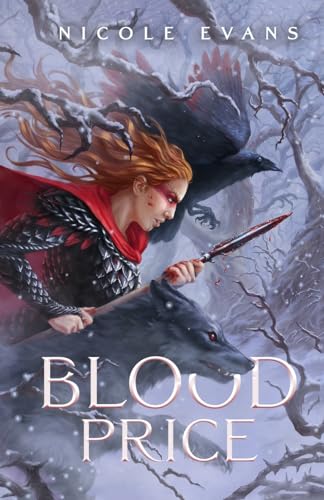Blood Price and Periods - Nicole Evans
17 Oct 2024The question I’ve gotten most often, when I’m marketing and I introduced Blood Price as a novel “inspired by periods,” is if I’m talking about the punctuation or the bodily function. Not only did this inspire me to be a bit more specific—“inspired by period pain and female rage,” which I feel is apt—but it also highlights perfectly why this novel is so important to me and why I wanted to write it in the first place. Because a novel about periods, menstruation, a natural bodily function? It’s so unheard of and hard to consider that a fantasy novel inspired by punctuation is seriously considered.
(Which, to be fair, I am sure someone could write a killer story about the dot at the end of a sentence. Writers can do anything. But, my point still stands.)
Blood Price is a very personal novel for me. All of my novels tend to be, as I’m usually using them to process something. I’ve been menstruating since I was fourteen years old and I turn thirty-two this November. Eighteen years is a long time to bleed each month, especially when my periods are heavy and painful. But it feels an even longer time when the only thing more consistent than a monthly cycle is the wide array of judgment I’ve received. From people not believing that my pain is real, to those who used my period as an excuse to diminish or ignore my emotions, to those who belittled my complaints or questioned when I took time off due to said pain, to those who even refused to talk to me or hang out with me after they found out I was on my period—taking it a step further even from those who refused to discuss it at all, calling my blood gross, my experiences unclean, my natural bodily function as disgusting. And this wasn’t “just” an experience that occurred in middle school, but carried with me into adulthood, where friends in college would ask me not to talk about my periods because it “grossed them out”. I mean, even saying the word “period” was enough to put people on edge. But if I said it aloud in public? Where someone could hear?
The horror.
Anyone who menstruates isn’t surprised by my experiences, as they’ve most likely experienced it themselves firsthand. The instinct to write an entire novel with periods at the core might not be everyone’s method of fighting back, but it’s the one that felt most natural to me, as I’ve used writing as a form of processing my entire life. (That’s why my newsletter and Patreon are full of very transparent, very personal posts.) With something that has been so consistent in my life, as both a bodily function and a way I’ve been shamed consistently, a newsletter wasn’t enough. The idea only became more concrete after those who claimed, after I shared this ambition, that such a novel wasn’t possible.
We love a woman who is stubborn and has something to prove.
As we’ve seen with the book bans spreading throughout America, books and the stories they tell are powerful. They have the power to change the world. I believe that with the very core of my being. I’m not so confident that Blood Price herself will be able to change the entire discourse about periods, though isn’t that the dream? From the language we use when talking about them (moving away from gendered to more-inclusive language that reflects the full spectrum of those who experience periods, as one example); to the way people who never have experienced bleeding between their legs so consistently comes from a place of ignorance and disgust; to the level of care, attention and research that is sorely lacking about reproductive and menstrual health. There is obviously a lot that needs to change and improve, so the experience of period shame—and the fact there is a period taboo to begin with—transitions from a practically universal experience to one only referenced in the history books.
I hope Blood Price and her inclusion of periods not just on the page, but as a central part of the plot of the novel, will help open doors to some of those conversations. Perhaps it will inspire others to include a menstrual scene in their books, until it becomes commonplace enough that even the word “period” isn’t something that is immediately silenced. Perhaps it will inspire more open discussions about our individual experiences—because I certainly didn’t capture every possible experience someone with a period can have on their cycle, using my own as a very heavy (pun intended) influence. Perhaps, one discussion at a time, it will inspire and continue to push for change that so many people are already working towards.
My greatest hope, however, is that it can be a balm for others who have felt belittled or disregarded or ignored by their own experiences with menstruation. That they can know they are not alone, that their experiences are not only valid, but they are shared. That someone out there knows their pain, believes their experiences and fights back against those who would claim otherwise.
That is why I wrote this book. It was a balm for me as much as it was sorrowful, inspiring and angering. Because now, whenever I am called a liar because my period pain “can’t be that bad,” or shushed because I’m attempting to talk about being on my period in public without using any coded phrases, I can look at them and tell them that perhaps they should read about what it could be like, before making such judgments, blanket statements and dismissive remarks. And when they come back and confidently claim that no such book could possibly exist, I can smile at them.
Of course it can, I’ll say. Because I wrote it.

You can get your own copy of Blood Price using this universal link
About Nicole Evans

Nicole Evans (she/hers) is a queer, disabled SFF writer. With an MFA in Fiction, more trunked novels than she can count and too many ideas to keep track of, she made her authorial debut with Blood Price. She currently lives in the Midwest with her partner and their pets, though she yearns to escape to the forest one day. You can find her online via her LinkTree.
